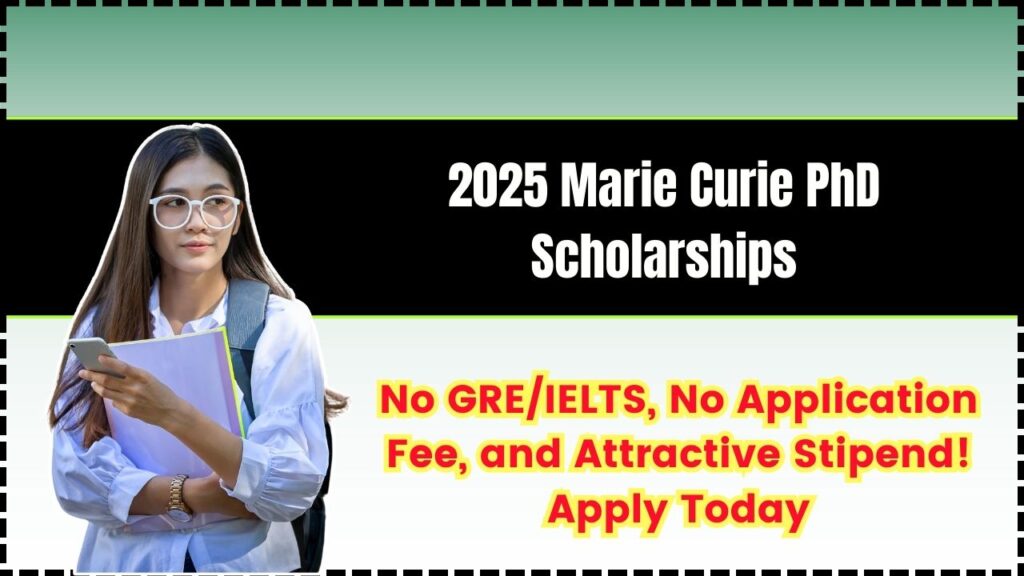2025 Marie Curie PhD Scholarships: The Marie Skłodowska-Curie Actions (MSCA) PhD Scholarships are some of the most prestigious and sought-after research opportunities in Europe. Named after the iconic scientist Marie Curie, these scholarships support early-career researchers who aspire to contribute to groundbreaking scientific discoveries. The MSCA provides fully funded PhD positions with attractive stipends, no GRE or IELTS requirements, and no application fees, making it accessible to talented candidates worldwide. As we look towards the 2025 application cycle, this article will explore all the essential details, including eligibility, the application process, the many benefits, and tips on how to succeed in this competitive opportunity.

2025 Marie Curie PhD Scholarships
| Key Information | Details |
|---|---|
| Who Can Apply? | Open to PhD candidates worldwide, with no GRE or IELTS required. Applicants must meet the MSCA mobility criteria. |
| Application Fee | There is no application fee for the MSCA PhD scholarships. |
| Funding | Fully funded PhD positions with attractive monthly stipends. Additional allowances for family, long-term leave, and special needs may be available. |
| Eligibility Criteria | Must have a master’s degree and meet the MSCA mobility rules: applicants cannot have resided in the host country for over 12 months in the past 36 months. |
| Application Process | Submit applications through the Funding and Tender Opportunities Portal. Check specific deadlines and requirements for each position. |
| Website for Details | Official MSCA website |
The 2025 Marie Curie PhD Scholarships represent an extraordinary opportunity for early-career researchers. With fully funded positions, no GRE or IELTS requirements, and the chance to work on groundbreaking projects in Europe, this is one of the best platforms for launching your academic career. Whether you are passionate about environmental science, technology, healthcare, or social issues, the MSCA program offers opportunities across a wide range of disciplines.
Introduction to the Marie Curie PhD Scholarships
The Marie Curie PhD Scholarships are part of the European Union’s Horizon Europe research program, which supports world-class researchers across all disciplines. These scholarships provide young, talented researchers the opportunity to pursue their PhD research at European institutions with cutting-edge scientific teams. Since their inception, the scholarships have fostered international collaboration and innovation, empowering researchers to contribute to high-impact, interdisciplinary studies.
What makes the Marie Curie scholarships stand out is the level of support they offer, not only in terms of financial aid but also in academic and professional development. With no application fees, and no requirement for GRE or IELTS tests, the program is designed to be accessible to talented researchers, irrespective of their geographical or financial background.
How the Marie Curie PhD Scholarships Work
1. Fully Funded PhD Positions
The Marie Curie PhD Scholarships are fully funded, meaning that all tuition fees and research costs are covered. PhD candidates receive a competitive stipend to cover their living expenses, which is adjusted based on the host country. Along with this, there is a mobility allowance to assist with travel costs and relocation expenses, and family allowances for eligible researchers with dependents.
Importantly, the scholarships cover the full duration of the PhD program (typically 3-4 years), allowing researchers to focus entirely on their academic work without the financial strain that often accompanies higher education.
2. Research Focus and Flexibility
The MSCA scholarships offer researchers the freedom to select from a diverse array of research fields, such as:
- Health and medical sciences
- Engineering and technology
- Environmental sustainability
- Social sciences and humanities
- Data science and artificial intelligence
Each project is carefully designed to address global challenges, ensuring that researchers contribute to solving real-world problems. The research conducted under the MSCA program has a strong focus on innovation, which means researchers not only gain in-depth expertise in their fields but also develop skills relevant to the job market.
3. No GRE or IELTS Requirement
Unlike many other scholarship programs, MSCA PhD Scholarships do not require GRE or IELTS scores, making them more accessible for researchers from diverse educational backgrounds. This opens the door for highly talented researchers who might not have the financial means to take these exams or those who have conducted research in non-English speaking institutions.
Instead of standardized test scores, the MSCA evaluates candidates based on academic qualifications, research potential, and fit with the project. This inclusive approach ensures that the selection process focuses on the researcher’s abilities rather than their ability to perform in a test.
4. Training and Networking Opportunities
MSCA PhD researchers benefit from a robust training program designed to help them develop both their research and professional skills. The program includes:
- Workshops and training sessions on specific research techniques.
- Networking opportunities with fellow researchers, scientists, and industry experts.
- Interdisciplinary exposure, working alongside professionals from different research fields and countries.
These opportunities are invaluable for building a strong academic network and gaining insights into the global research landscape, which will benefit researchers long after their PhD completion.
5. A Global Research Community
The Marie Curie program encourages international collaboration. PhD researchers often work in different countries, allowing them to gain diverse perspectives and integrate various research methodologies. This international exchange fosters a global approach to research and opens the door for researchers to collaborate with leading institutions, think tanks, and industries worldwide.
Moreover, the mobility rule of the program ensures that researchers move to a different country for their research, making it a truly international experience.
How to Choose the Right PhD Project
With so many diverse opportunities available, selecting the right research project is crucial to your academic and career success. Here are some tips to help you choose wisely:
1. Align with Your Interests and Skills
First and foremost, the research project should align with your academic interests and long-term career goals. Consider the following:
- Does the project align with your academic background?
- Are you passionate about the topic, and does it excite you?
- How does the project fit into your broader career trajectory?
Choosing a project that matches your skills and interests will keep you motivated and engaged throughout the course of your PhD.
2. Evaluate the Host Institution’s Reputation
The quality of the host institution and research team is another key factor. Look for institutions with a proven track record of groundbreaking research in your field of interest. Additionally, research the team that will supervise your PhD. Are they experienced mentors? Do they have a reputation for supporting PhD researchers?
3. Consider Networking Opportunities
The MSCA program is an excellent way to expand your professional network. Consider which institutions or research teams offer the best networking opportunities in your field. Collaborative projects with industry partners or other research institutions are valuable opportunities to build lasting connections.
How to apply for 2025 Marie Curie PhD Scholarships
Now that you know how the Marie Curie PhD Scholarships work, let’s break down the application process into easy steps.
Step 1: Eligibility Check
Make sure you meet the basic requirements for the program:
- A master’s degree or equivalent before applying.
- No more than 4 years of research experience at the time of application.
- You cannot have lived in the country of your host institution for more than 12 months in the past 36 months (mobility rule).
Step 2: Search for Available Positions
Browse the Funding and Tender Opportunities Portal for available MSCA PhD positions. You can filter your search based on your field of interest, country, or host institution. Make sure to read the project description carefully to ensure a good match.
Step 3: Prepare Your Application
For each position, you will need to submit:
- A CV that highlights your research experience, academic qualifications, and skills.
- A research proposal outlining the project you want to pursue.
- A motivation letter detailing why you’re interested in the project and why you’re a strong candidate.
Step 4: Submit Your Application
Applications must be submitted through the European Commission Portal. Check the specific deadlines for each project, as they may vary.
Step 5: Interview and Selection
If shortlisted, you will be invited for an interview, either online or in person. Be prepared to discuss your research proposal in detail and demonstrate your enthusiasm for the project.
Step 6: Start Your Research
Once selected, you will begin your PhD research, benefiting from the funding, training, and international experience that the MSCA provides.
Want to Study Nursing in Hungary? Semmelweis University Offers 2025 Scholarships!
Lund University Global Scholarship 2025 – Fully Funded Opportunity for International Students!
Asian Future Leaders Scholarship at Kyoto University – Full Funding for 2025!
FAQs About 2025 Marie Curie PhD Scholarships
1. Do I need GRE or IELTS scores?
No, the MSCA PhD Scholarships do not require GRE or IELTS scores. Applicants are evaluated based on their academic qualifications and research potential.
2. How much is the stipend?
The stipend varies by host country but typically includes a monthly living allowance, a mobility allowance, and additional family allowances if applicable.
3. How long is the PhD program?
The PhD duration is typically 3-4 years, depending on the specific project.
4. Can I apply to multiple positions?
Yes, you can apply to several positions, but ensure that each application is tailored to the specific project.
5. Is the program open to non-EU candidates?
Yes, the MSCA PhD Scholarships are open to candidates from all countries, provided they meet the eligibility criteria.








